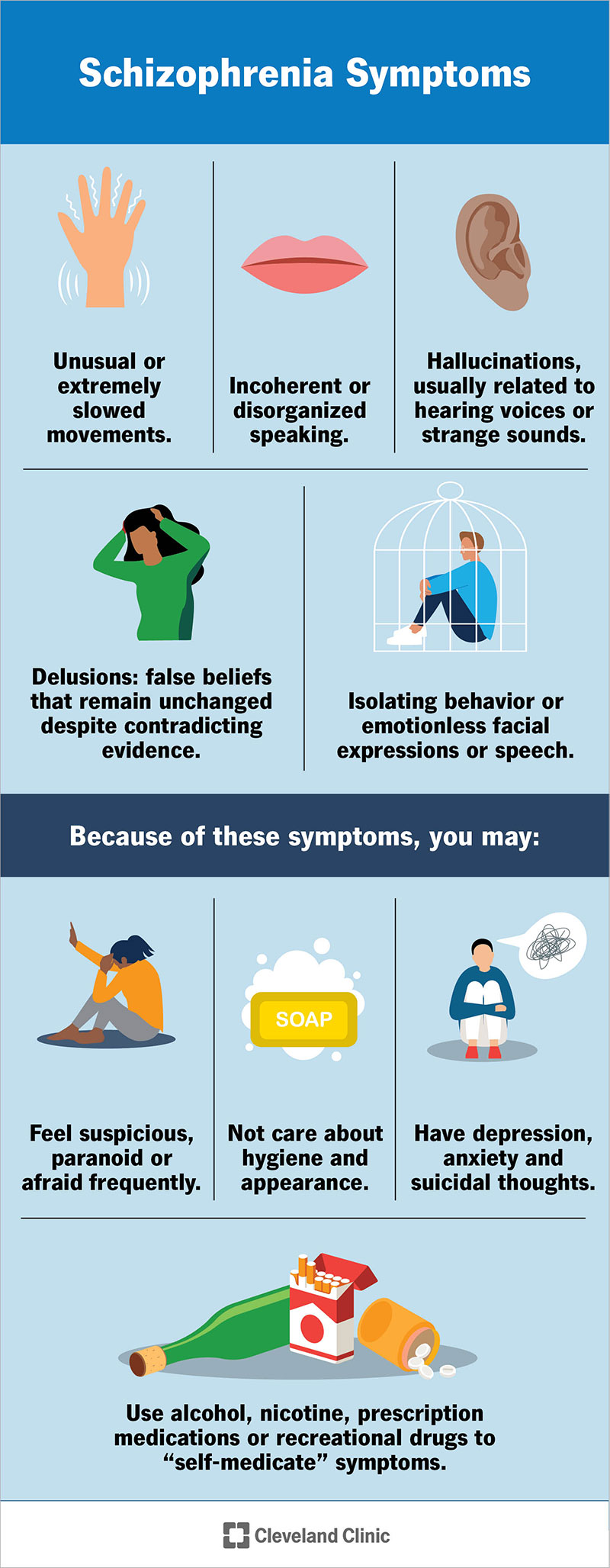Schizophrenia is a mental health disorder that changes how you think, feel and act. It can cause delusions, hallucinations and disorganized thinking. While there’s no cure, treatment like medications and therapy can help manage symptoms. Continued care and support are essential.
Advertisement
Cleveland Clinic is a non-profit academic medical center. Advertising on our site helps support our mission. We do not endorse non-Cleveland Clinic products or services. Policy
Schizophrenia is a mental health condition that affects how you think, feel and behave. It can make it hard to know what’s real and what isn’t.
Advertisement
Cleveland Clinic is a non-profit academic medical center. Advertising on our site helps support our mission. We do not endorse non-Cleveland Clinic products or services. Policy
It can lead to symptoms like:
These symptoms can have a major impact on your daily life and relationships.
This condition affects an estimated 1 in 300 people worldwide.
While it’s a lifelong disorder, treatment can help you manage symptoms so you can feel better.

Image content: This image is available to view online.
View image online (https://my.clevelandclinic.org/-/scassets/images/org/health/articles/4568-schizophrenia-1)
People with schizophrenia often don’t know they have symptoms. But others, like friends and family, may notice them.
Symptoms may include:
Advertisement
The cause of schizophrenia isn’t known. Experts believe it may happen for different reasons, like:
Your risk may increase due to the following:
Complications of schizophrenia may include:
Your risk of suicidal thoughts and suicide also increases with schizophrenia. If you ever need help or someone to talk to, call or text 988 (U.S.). This is the Suicide & Crisis Lifeline. Someone can speak with you 24/7. If you need immediate medical attention, call 911 or your local emergency services number.
A healthcare provider can diagnose schizophrenia by learning more about your symptoms. To do this, they’ll observe your behavior or ask you questions about what you’re experiencing. They’ll compare those with the criteria in the Diagnostic and Statistical Manual of Mental Disorders, Fifth Edition (DSM-5). They’ll also take a complete medical history.
A diagnosis usually happens during the late teen years or early adulthood. Males typically notice symptoms sooner (early 20s) than females (mid 20s to early 30s). Schizophrenia in children is rare but possible.
There aren’t any diagnostic tests for schizophrenia. But healthcare providers may run tests to rule out other conditions before diagnosing schizophrenia, like:
Treatment for schizophrenia may include:
Advertisement
If medications don’t improve your symptoms, your provider may recommend other options. One is electroconvulsive therapy (ECT). ECT is a safe treatment that sends small electric signals to your brain. It causes a short seizure to help your brain work differently.
Antipsychotic medications are a key part of treating schizophrenia. These may include:
There are two main types of antipsychotics: first and second generation. First generation (typical) blocks dopamine receptors. Second generation (atypical) targets dopamine and serotonin receptors. These medications adjust the balance of these brain chemicals (neurotransmitters). An imbalance of chemicals may cause symptoms like delusions and hallucinations.
Emerging treatments are expanding. One example is a newly approved combination of xanomeline and trospium chloride (Cobenfy). This works through the cholinergic system. This system helps control things like memory, thinking and muscle movement. It doesn’t mainly target dopamine receptors the way traditional antipsychotics do. It marks the first in a new class of antipsychotic drugs.
Advertisement
Talk to your provider about what possible side effects to look out for if you start a new medication.
If you have schizophrenia, you’ll need to schedule regular visits with your healthcare provider. Follow up with them as recommended and anytime you notice changes in your symptoms. Let them know if you have any medication side effects, especially ones that are disruptive to your daily routine. They may be able to adjust your treatment or recommend other options that work better for you.
This mental health disorder varies greatly from person to person. While schizophrenia can affect many parts of daily life, treatment may help you manage symptoms more effectively.
Symptoms often come in cycles. These are periods when they flare up and times when they improve, but don’t fully go away completely. It’s important to continue treatment as directed, even when you’re feeling better, to prevent setbacks and maintain progress.
Some people respond well to treatment but may still face ongoing challenges, like difficulty thinking clearly or staying focused. This is common. Your care team can work with you to adjust your treatment as needed.
Schizophrenia isn’t deadly on its own. But without treatment, it can lead to serious problems, like a higher chance of suicide. That’s why ongoing care, support and open communication with your providers are essential.
Advertisement
Schizophrenia can feel overwhelming, both for you and those who care about you. But it’s important to know that with the right care, many people find stability.
If you’re concerned about changes in your or a loved one’s thoughts, feelings or behavior, consider talking to a healthcare provider. Mental health professionals have the training to listen, support and guide people through this condition without judgment. Getting help can make a lasting difference.
Living with schizophrenia isn’t easy, but treatment can help you take back control and move forward.

Sign up for our Health Essentials emails for expert guidance on nutrition, fitness, sleep, skin care and more.
Learn more about the Health Library and our editorial process.
Cleveland Clinic’s health articles are based on evidence-backed information and review by medical professionals to ensure accuracy, reliability and up-to-date clinical standards.
Cleveland Clinic’s health articles are based on evidence-backed information and review by medical professionals to ensure accuracy, reliability and up-to-date clinical standards.
Your mental well-being is just as important as your physical well-being. Cleveland Clinic’s mental health experts can help you live life to the fullest.
